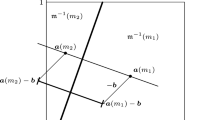Abstract
We introduce the possibility that the receiver naively believes the sender’s message in a game of information transmission with partially aligned objectives. We characterize an equilibrium in which the communication language is inflated, the action taken is biased, and the information transmitted is more precise than in the benchmark fully-strategic model. We provide comparative statics results with respect to the amount of asymmetric information, the proportion of naive receivers, and the size of the sender’s bias. As the state space grows unbounded, the equilibrium converges to the fully-revealing equilibrium that results in the limit case with unbounded state space.
Similar content being viewed by others
References
Austen-Smith D (1990) Information transmission in debate. Am J Polit Sci 34:124–152
Baron D (1994) Electoral competition with informed and uninformed voters. Am. Polit. Sci Rev 88:33–47
Battaglini M (2002) Multiple referrals and multidimensional cheap talk. Econometrica 70:1379–1401
Benabou R, Laroque G (1992) Using privileged information to manipulate markets: insiders, gurus, and credibility. Q J Econ 107:921–958
Blume A, Kim YG, Sobel J (1993) Evolutionary stability in games of communication. Games Econ Behav 5:547–575
Blume A, DeJong DV, Kim YG, Sprinkle GB (1998) Experimental evidence on the evolution of meaning of messages in sender-receiver games. Am Econ Rev 88:1323–1340
Cai HB, Wang J (2006) Overcommunication in strategic information transmission games. Games and Econ Behav 56:7–36
Callander S, Wilkie S (2005) Lies, damned lies, and political campaigns. Mimeo
Chen Y (2005) Perturbed communication games with honest senders and naive receivers. Mimeo
Crawford V (2003) Lying for strategic advantage: rational and boundedly rational misrepresentation of intentions. Am Econ Rev 93:133–149
Crawford V, Sobel J (1982) Strategic information transmission. Econometrica 50:1431–1452
Dessein W (2002) Authority and communication in organizations. Rev Econ Stud 69:811–838
Dickhaut JW, McCabe KA, Mukherjee A (1995) An experimental study of strategic information transmission. Econ Theory 6:389–403
Forges F, Koessler F (2003) Communication equilibria with partially verifiable types. Mimeo
Forsythe R, Lundholm R, Rietz T (1999) Cheap talk, fraud, and adverse selection in financial markets: Some experimental evidence. Rev Financ Stud 12:481–518
Gilligan TW, Krehbiel K (1989) Asymmetric information and legislative rules with a heterogeneous committee. Am J Polit Sci 33:459–490
Groseclose T, Milyo J (2003) A measure of media bias. Mimeo
Grossman GM, Helpman E (2001) Special interest politics. MIT Press, Cambridge
Holmström BR (1977) Chapter 2: Delegation. In: Incentives and control in organizations. Ph.D. Dissertation, Stanford University
Kartik N (2005) Information transmission with almost-cheap talk. Mimeo
Kartik N, McAfee RP (2006) Signaling character in electoral competition. Am Econ Rev (forthcoming)
Kartik N, Ottaviani M, Squintani F (2006) Credulity, lies, and costly talk. J Econ Theory (forthcoming)
Malmendier U, Shanthikumar D (2005) Are investors naive about incentives? Stanford Graduate School of Business mimeo
Manelli A (1996) Cheap talk and sequential equilibria in signaling games. Econometrica 69:917–942
Matthews SA (1989) Veto threats: rhetoric in a bargaining model. Q J Econ 104:347–369
Morgan J, Stocken P (2003) An analysis of stock recommendations. RAND J Econ 34:183–203
Morris S (2001) Political correctness. J Polit Econ 109:231–265
Sobel J (1985) A theory of credibility. Rev Econ Studies 52:557–573
Stein J (1989) Cheap talk and the Fed: a theory of imprecise policy announcements. Am Econ Rev 79:32–42
Author information
Authors and Affiliations
Corresponding author
Rights and permissions
About this article
Cite this article
Ottaviani, M., Squintani, F. Naive audience and communication bias. Int J Game Theory 35, 129–150 (2006). https://doi.org/10.1007/s00182-006-0054-1
Revised:
Published:
Issue Date:
DOI: https://doi.org/10.1007/s00182-006-0054-1




